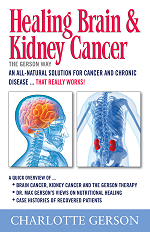| |
Archived from
Charlotte Gerson's booklet

Story
On
January 19, 1986, David Nelson, in his mid-30's, was admitted to
a hospital for what appeared to be a grand mal seizure (epilepsy). A
few months before that he had been treated for chest and abdominal
pains, and also for obesity and stress headaches. This time the doctors
thought that David had a cyst on his brain, which only needed
draining. But when they opened up his head, they found an astrocytoma,
a tumor the size of a large lemon, with "crabgrass" roots
growing throughout his brain. They were able to remove roughly half
of the mass, but couldn't get rid of the spreading roots. The operation
took place on a Sunday. David couldn't remember anything until he
woke up on Thursday morning, when the doctors appeared and told
him that he had about two months to a year to live.
Next, David underwent radiation treatment over a period of six
weeks, which didn't bring any improvement. Meanwhile his father
Bill found Dr. Gerson's book, A Cancer Therapy: Results of 50 Cases,
in a health food store; the case histories of recovered patients
impressed him greatly. As a result, in April 1986 David arrived at the
Gerson Hospital in Mexico, to start on the intensive therapy.
His first scan after embarking on the therapy didn't show any
reduction in the size of his tumor, compared to a scan made after the
surgery. But a year and three months after David started on the
Gerson program, the radiologist who carried out an MRI brain scan
by Oakland Magnetic Imaging Services in July 1987, reported that
the mass "has considerably decreased since the previous scan in
February 1986. No new areas of abnormal signal intensity are seen."
This result was greatly encouraging, but David still had a long way
to go. In fact, he returned to the Gerson Hospital every six months
for a refresher, to discuss his progress with the doctors and have blood
tests. By 1989 his strength had returned, he had plenty of energy and
was confident about the future. A scan taken that year, in April,
showed only a very small "irregular" area where the tumor had been,
and that was presumably scar tissue left by the original operation.
David's survival after a hopeless prognosis and his return to
robust
health on the Gerson Therapy was an extraordinary achievement.
Unfortunately, his story did not have a happy ending. After enjoying
some seven years of excellent health, he decided to build a new house
for his family. In doing so he came into contact with a large amount
of various toxic chemicals; also, he neglected the "maintenance
program" which recovered Gerson patients - especially formerly
"hopeless" cases - are advised to stick to. In 1996 he suffered a
recurrence, and within a year, passed away.

|
|
